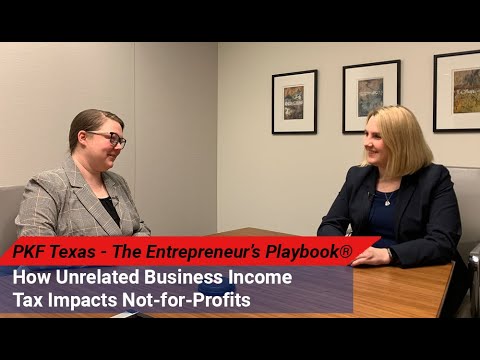How Unrelated Business Income Tax Impacts Not-for-Profits

Jen: This is the PKF Texas – Entrepreneur’s Playbook®. I’m Jen Lemanski, and I’m here today with Emily Smikal, a Director in our tax department and one of the faces of the PKF Texas not-for-profit team. Emily, welcome to the Playbook.
Emily: Thanks, Jen. Thanks for having me.
Jen: So, I’ve heard you talk before about this thing called “unrelated business income tax.” How does that impact not-for-profits, and what should they know?
Emily: First, let’s call it UBI just to keep it more simple. UBIT, unrelated business income tax, is an income tax imposed on certain not-for-profit organizations that conduct certain activity that is not related to their tax-exempt purpose.
Jen: So, what would qualify for that?
Emily: So, there’s three criteria to be met for income to be UBI.
- First, UBI is income from a trade or business, so something from the sale of goods or providing services, something that’s with the intent to make a profit.
- The second, is that it’s regularly conducted, so the frequency and the continuity is considered.
- And the third, probably the most important factor, is that it is not substantially related to the organization’s exempt purpose, so it doesn’t contribute importantly to what their exempt purpose is.
Jen: So, once it’s determined that they have UBI, what happens next?
Emily: So, if they have at least $1,000 of UBI, then they’re required to file a Form 990-T in addition to their Form 990, and on that form, the UBI is taxed at a 21% rate.
Jen: Is there anything else that they need to know about it?
Emily: So, one important thing is that prior to tax reform, if organizations had multiple activities of UBI, they were allowed to net them together. So, if they had income from one, loss from another, they can net them prior to calculating the tax. However, now the tax reform has changed that and the IRS is requiring that each UBI activity is reported separately to calculate tax, so no longer are they allowed to offset each other.
Jen: So, is that something that we help them look at when they’re filling out their 990s?
Emily: Absolutely. If there’s any questions on UBI, how to calculate it, how to calculate the tax, that’s what we’re here to help with.
Jen: Perfect. Well, we’ll get you back to talk a little bit more about some tax topics related to not-for-profits. Sound good?
Emily: Sounds great.
Jen: This has been another Thought Leader production brought to you by PKF Texas – The Entrepreneur’s Playbook®. For more information about this topic, visit www.pkftexas.com/NotForProfit. Tune in next week for another chapter.

